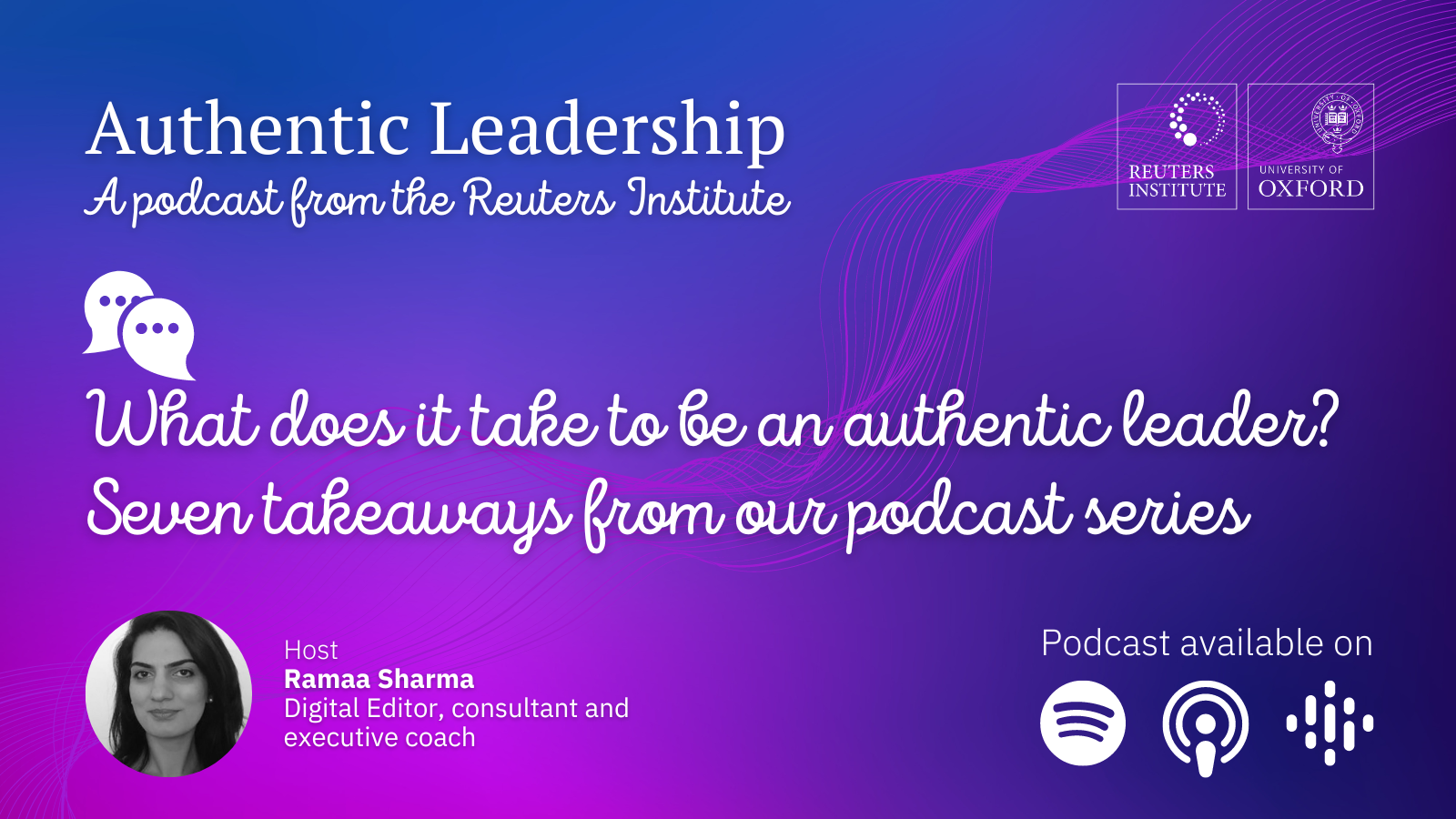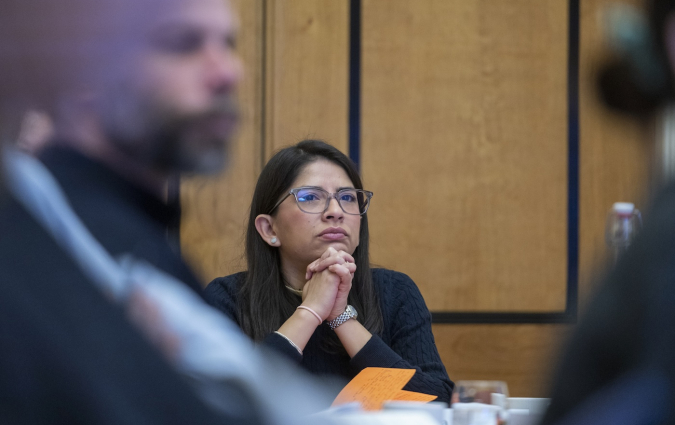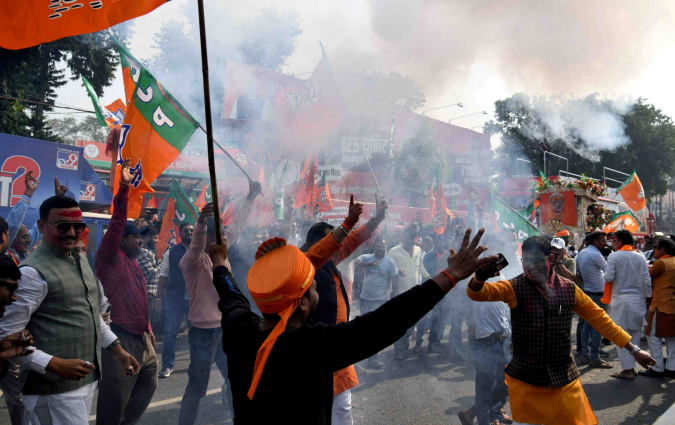What does it take to be an authentic leader? Seven takeaways from our podcast series

Earlier this year I hosted Authentic Leadership, a five-episode podcast series exploring the value of authenticity and why it should matter to newsrooms and newsroom leaders around the world.
I started the podcast exploring the term authenticity, the idea of being oneself to discover what it could mean in the context of leadership. Then I interviewed a number of executives from India, Nepal, Nigeria, Mexico and Brazil, and asked them whether they felt they could be themselves at work. In this article I share some of the things I learnt from their leadership journeys in the hope they are useful for others.
1. Being authentic is not always easy
In the first episode I asked Stéphane Mayoux and Ruchika Tulshyan what authenticity meant to them. Mayoux is a psychotherapist and a former editor. Tulshyan is a diversity and inclusion specialist, and a former business journalist.
From a psychotherapeutic perspective, Mayoux said that authenticity is often a conscious choice and that adapting is a normal and natural process:
So if this heavy coat is inevitable what impact does it have on individuals having to adapt to more than one culture? And what if the cultures are markedly different in values, customs and worldviews?
Ruchika grew up in Singapore to Indian immigrant parents and attended an international school. She explained that she found the journey of adapting and being true to oneself fraught and confusing:
She added that it doesn’t necessarily get any easier in adulthood:
For more on the conversation exploring what ‘authenticity’ means with Ruchika and Stéphane listen to episode one below.
Spotify | Apple | Google | Full transcript
2. Authenticity can come at a cost
In episode 2, Anup Kaphle, editor-in-chief of the news site Rest of World, shared how authenticity came at a cost when he first arrived in the United States. At college Anup had to change significantly, including the way he spoke, in order to be accepted. This had a big impact on him:
Several years later, Anup would also find it difficult to report on the stories he wanted to tell. On one occasion he was even threatened with deportation if he didn’t reveal his sources. You can listen to Anup’s story in the episode below.
Spotify | Apple | Google | Full transcript
3. Authenticity can be threatening
In episode 3 Yvette Dimiri, Head of Growth at Stears Insights in Nigeria, shared how her first leadership experience was mired by what looked like ageism and sexism.
When Yvette was brught into Stears to lead digital transformation, she hadn’t expected the hostility she would face for wanting to innovate and change newsroom practices. This is what she experienced:
When I asked Yvette what she did and how she coped with such instances she said:
To hear more of Yvette’s journey and to learn where she got her resilience from listen to episode 3 below.
Spotify | Apple | Google | Full transcript
4. The quest for authenticity is not always a top priority
In episode 4 we met Rupa Jha. Today Rupa is the head of the BBC’s bureau in India. She started out as a producer over 20 years ago and is now responsible for leading more than 250 journalists in the BBC’s biggest bureau outside of London.
But this trajectory was not always a given. At the beginning of her career Rupa was full of self-doubt. Born in one of the poorest states in India, the opportunities for her as a woman were limited. Her worldview and her approaches were also constantly questioned. Rupa’s priority was success. She felt a fierce desire to transcend her childhood reality. The pursuit of authenticity came to her later. She says:
Hear Rupa’s story in full below.
Spotify | Apple | Google | Full transcript
5. Authenticity is a privilege
In the final episode of the podcast series we heard from two leaders from Latin America. The first is Fernanda Delmas, Editor-in-Chief of Brazil's leading financial title Valor Econômico.
Fernanda shared how she had to conform to male standards at the beginning of her career. There was an expectation in the newsroom that she would alter the way she looked and dressed. She also recalls how women were propositioned by their seniors, and how if they declined, their careers were threatened.
Today she says that some things have improved but there’s still some way to go. She thinks it is still particularly challenging for Black women in the workplace:
To hear more of Fernanda’s story and how she’s changing Valor Econômico to be a more diverse and inclusive place to work, listen below.
Spotify | Apple | Google | Full transcript
6. Authenticity requires courage and healing
Finally, I spoke to Marcela Turati, an award-winning journalist and the co-founder of two nonprofits in Mexico: A dónde van los desaparecidos, a project tracking stories of disappeared people, and Quinto Elemento, an initiative to train the next generation of Mexican investigative journalists.
Living in one of the most dangerous places to be a reporter, Marcela is reinventing journalism through her projects to ensure the safety of all involved. She does this by collaborating across organisations, sharing exclusives (so individual journalists are harder to target), training and providing healing spaces to deal with the traumas local reporters face on a regular basis.
Her work has won several awards and her network has grown exponentially. But Marcela’s journey has not been easy. She has had to face relentless criticism and sexism along the way.
Marcela continues to pioneer new approaches to support frontline staff as well as doing some of the difficult reporting herself. For her, journalism is the mission, but rest and healing are also necessary requisites:
To hear more about Marcela’s projects, ambitions and the workshops she runs for journalists listen to the final episode below.
Spotify | Apple | Google | Full transcript
7. Authentic leadership can bring change
All the leaders in the series have faced challenges beyond the complexities of the roles they were recruited for. They have had to contend with being told that who they are is a problem. They were either not good enough or their ideas were too much, too different, too young or too female. In some cases it was implied that their ethnicity was a problem.
All the leaders have had to make choices about the behaviour they were confronted with. Instead of seeing leaving their organisations as ‘failing,’ leaders like Anup and Marcela have gone on to forge new and necessary institutions.
Others like Rupa and Fernanda chose to stay and are now senior enough to create the changes they wished to see. Regardless of the routes these leaders have opted for they have, and are creating, meaningful change as a result of being true to themselves.
A final thought for organisations
If you want to see real change, fairer workplaces and better journalism, you need to make space for and nurture these kinds of authentic leaders.
Have you asked how the leaders from minority backgrounds in your companies are doing? Some newsrooms may not even employ any of them.
In some countries the minorities are women, people from a different class, caste, ethnicity or other protected characteristic. Are you aware of the additional challenges and barriers they may be facing? Have you spoken to them about it? Are your systems equipped with supporting them adequately? And what about the culture of the company? Does it enable inclusion and belonging?
The subject of authenticity and leadership is an ongoing subject of study for Ramaa so if you would like to get in touch in response to the above or to contribute feel free to reach out to her via her website: www.ramaasharma.com
If you want to learn more about these issues:
In every email we send you'll find original reporting, evidence-based insights, online seminars and readings curated from 100s of sources - all in 5 minutes.
- Twice a week
- More than 20,000 people receive it
- Unsubscribe any time







